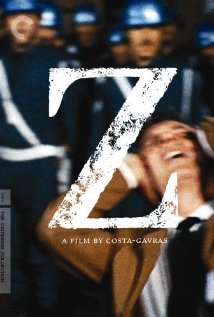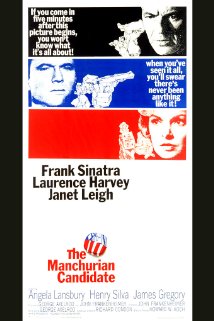By Film Noir Blonde and Mike Wilmington
The Noir File is FNB’s guide to classic film noir, neo-noir and pre-noir from the schedule of Turner Classic Movies (TCM), which broadcasts them uncut and uninterrupted. The times are Eastern Standard and (Pacific Standard).
Pick of the Week
 “Z” (1969, Costa-Gavras). 3:45 p.m. (12:45 p.m.). Tuesday, Feb. 4.
“Z” (1969, Costa-Gavras). 3:45 p.m. (12:45 p.m.). Tuesday, Feb. 4.
In Greece, in the turbulent 1960s, under the tyrannical reign of “The Colonels,” an extremely popular leftist opposition leader (played by Yves Montand and based on the real-life politician Lambrakis) tries to speak at a political rally. But, before he even arrives, he is frustrated by the Greek police, by obstructionist “regulations” and by a vicious band of hecklers and armed thugs outside the hall. Finally, while crossing the street to the rally, Montand’s political leader is assaulted with a blow to the head that eventually kills him.
The police do nothing, though the killers are well known to them. These deliberately undiligent law enforcers and unresponsive government leaders (namely Pierre Dux) ignore the facts and leads, including one persistent witness (Charles Denner), whom the assassins try to run down in the street s most famous scene and image). But an incorruptible court investigator (Jean-Louis Trintignant) and a crusading young journalist (Jacques Perrin) keep gathering facts and tracking down the guilty.
Greek-French director Constantin Costa-Gavras had had an early ’60s film noir hit with his first film, the cop thriller “The Sleeping Car Murders.” It’s a fast exhilarating murder mystery, based on the Sebastian Japrisot novel, with a cast that boasted many of the same actors as “Z“: Montand, Trintignant, Perrin, and Denner. In “Z,” working with screenwriter Jorge Semprun, Gavras goes further, digs deeper. He exposed a real-life murder and a plot that involved the Greek police, right-wing political parties and government leaders — all part of the oppressive Greek regime.
The film’s impact was enormous. The French-made “Z,” a huge international hit and the 1970 Oscar-winner for Best Foreign Language Picture, is one of the most influential true-crime thrillers ever made. (In French, with English subtitles.)
Wednesday, Jan. 29
 8 p.m. (5 p.m.): “The Manchurian Candidate” (1962, John Frankenheimer). With Frank Sinatra, Laurence Harvey, Janet Leigh and Angela Lansbury Reviewed in FNB on July 18, 2013.
8 p.m. (5 p.m.): “The Manchurian Candidate” (1962, John Frankenheimer). With Frank Sinatra, Laurence Harvey, Janet Leigh and Angela Lansbury Reviewed in FNB on July 18, 2013.
12:15 a.m. (9:15 a.m.). “Pennies from Heaven” (1981, Herbert Ross). Adapted from writer Dennis Potter’s brilliant British TV mini-series, this Depression-era film noir musical was probably star Steve Martin’s finest hour. He plays a traveling salesman, who, together with the ravishing Bernadette Peters, sings and lip-synchs his way to an unplanned career as an outlaw lover on the run. One of the major unfairly neglected Hollywood musicals, and a marvelous neo-noir. Features a wonderful score of vintage period recordings (including the title song) and standout dancing from lanky Christopher Walken.
Thursday, Jan. 30
9:45 a.m. (6:45 a.m.): “The Kennel Murder Case” (1933, Michael Curtiz). William Powell plays the snobbish Manhattan socialite/sleuth Philo Vance as he turns his detecting prowess to foul play at a Long Island dog show. Snappily acted by Powell and directed by Curtiz, and one of the best Golden Age detective series movies.
10:15 p.m. (7:15 p.m.): “What Ever Happened to Baby Jane?” (1962, Robert Aldrich). With Bette Davis, Joan Crawford and Victor Buono. Reviewed in FNB on July 28, 2012.
Sunday, Feb. 2
6 a.m. 3 a.m.: “The Letter” (1940, William Wyler). With Bette Davis, Herbert Marshall and James Stephenson. Reviewed in FNB on Sept. 19, 2012.
6:15 p.m. (3:15 p.m.): “12 Angry Men“ (1957, Sidney Lumet). With Henry Fonda, Lee J. Cobb, Ed Begley and Jack Warden, Reviewed in FNB on June 13, 2013.
8 p.m. (5 p.m.): “The Lost Weekend” (1945, Billy Wilder). Ray Milland as Don Birnam, an alcoholic writer is left alone by his girlfriend (Jane Wyman) and his brother (Phillip Terry) for a long, lost weekend in New York City. In something close in mood to a German expressionist nightmare, Don will try to sell his soul for a bottle, to find the booze (and the shame) that he’s hidden, and to stumble from (drunken) ecstasy to (withdrawal) agony, from life to near-death, from one empty glass to another.
It’s a noir without crime, but with plenty of guilt and punishment. “The Lost Weekend” won the Best Picture Oscar; Wilder won Oscars for directing and co-writing, and Milland won Best Actor.
The film’s source was the best-selling novel by Charles Jackson, himself an alcoholic writer, and a man who knew whereof he spoke. (The actress playing the hat-check girl in the night club became Wilder’s wife, Audrey Wilder.)
2:15 a.m. (11:15 p.m.): “Spellbound” (1945, Alfred Hitchcock). With Ingrid Bergman, Gregory Peck and Leo G. Carroll. Reviewed in FNB on Jan. 9, 2013.
Monday, Feb. 3
7 a.m. (4 a.m.): “Mildred Pierce” (1945, Michael Curtiz). With Joan Crawford, Jack Carson, Ann Blyth and Zachary Scott. Reviewed in FNB on Dec. 1, 2010.
4:15 a.m. (1:15 a.m.): “Rebel Without a Cause” (1955, Nicholas Ray). With James Dea, Natalie Wood, Sal Mineo and Dennis Hopper. Reviewed in FNB on April 13, 2013.










From FNB readers